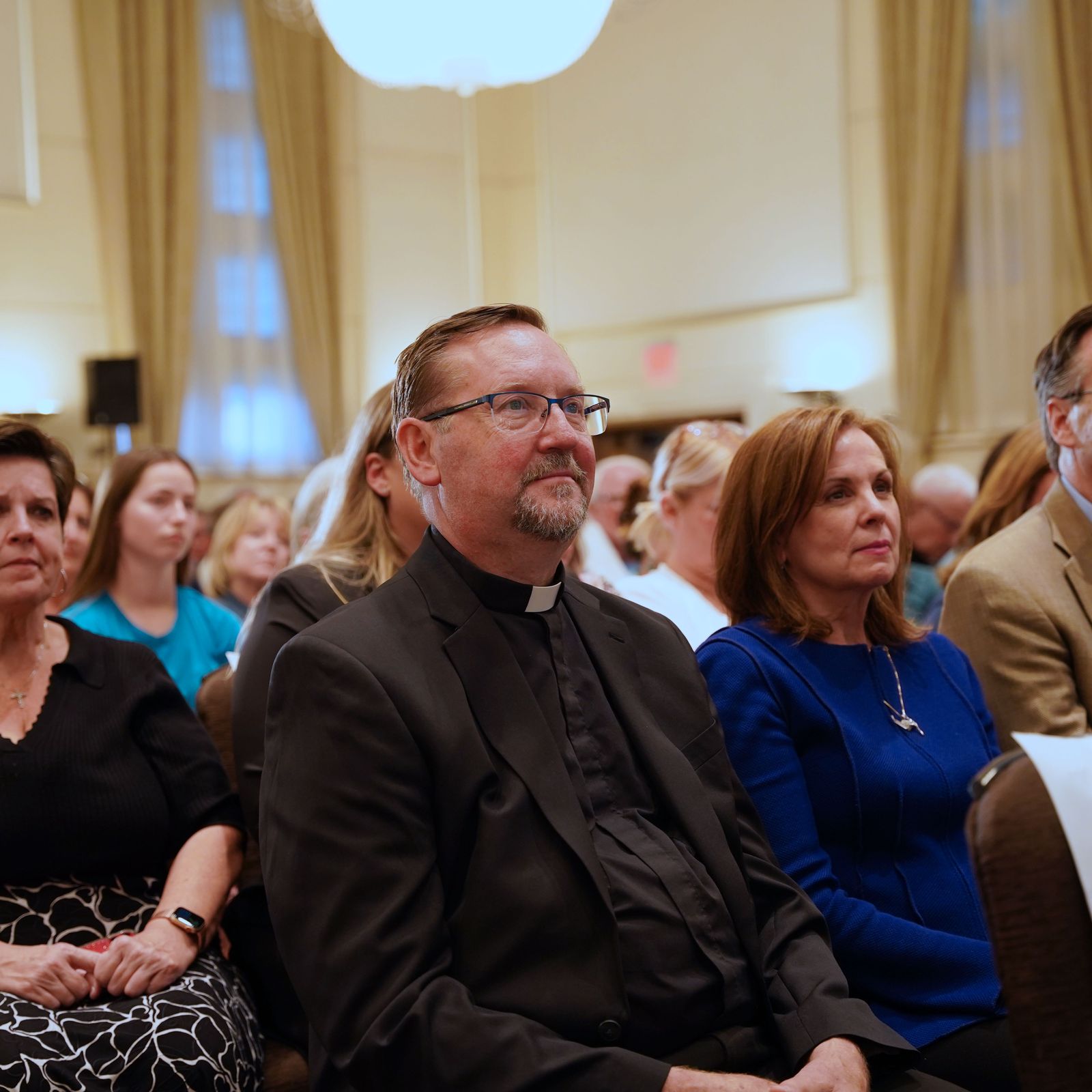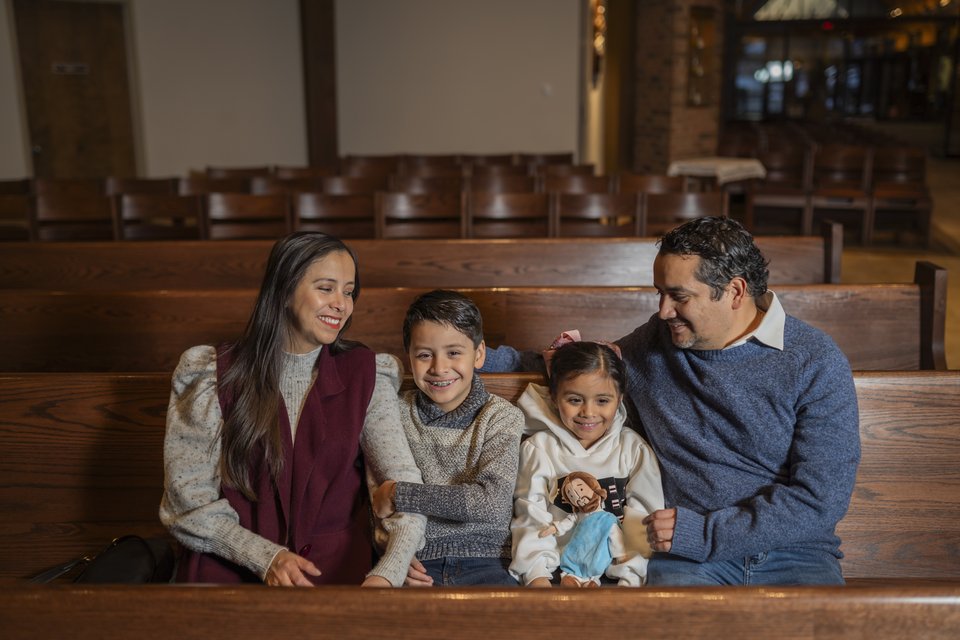'Bible in a Year' host highlights four cardinal virtues during seminar at Plymouth retreat center: For Christians, 'failure isn't final'
PLYMOUTH — Fr. Mike Schmitz told an estimated 1,000 Catholics that the greatest basketball players of all time aren’t remembered because they never committed a foul, but because of how they played the game.
Likewise, the greatest saints of the Church aren’t remembered because they never sinned, but because they played to win. "Father Mike," as he is known from his wildly successful podcasts, including "The Bible in a Year" and "The Catechism in a Year," spoke Aug. 9 at St. John’s Resort in Plymouth — the site of the former St. John’s Provincial Seminary.
Fr. Schmitz stressed how, all too often, Christians dwell too much on the times when they have fallen or might fall, and not enough on the end goal.
“So many times we Christians act like we don’t know what it’s like to play to win,” said Fr. Schmitz, a priest of the Diocese of Duluth, Minn. “We know what it’s like to play not to lose, and there is a huge difference. Players who play not to lose, play scared. As opposed to those who play to win, who make an error and think, ‘OK, on to the next thing.’ Tonight, let’s have a radical mind shift to have the life of a Christian who plays to win.”

The event kicked off the third season of a monthly speaker series that previously was hosted at the National Shrine of the Little Flower Basilica in Royal Oak. Future speakers will include Lisa Brenninkmeyer, founder of the women's Bible study series "Walking with Purpose" (Sept. 19), Fr. Joe Krupp, a priest of the Diocese of Lansing (Oct. 11), and Fr. Jim Sichko, a Kentucky priest who has served as one of Pope Francis' "missionaries of mercy" (Nov. 15). This season's events will take place at St. John's Resort.
Fr. Schmitz said the goal in life isn’t to be perfect, but to fulfill the meaning God intends for each and every one of His creations.
“Why did God make you? To know Him and love Him and serve Him in this life, so as to live with Him forever in the next,” Fr. Schmitz said. “That’s the reason that ends up becoming the goal. ... That is the point of being alive. That is the goal: to be with God.”
To reach this goal, Fr. Schmitz proposed an exercise: When a person dies and stands before the gates of heaven, and the angels ask the person why they should be let in, what should a person say?
“I ask middle schoolers this all the time, and the answers are what you expect,” Fr. Schmitz said. “'Well, I’m a good person. I’m nice. I serve people. I went to Mass every single Sunday. Didn’t lie, cheat, steal. I’m not the worst person I know.'

“But there really is only one right answer,” Fr. Schmitz continued. “There are two versions of it. The one-word answer, 'Jesus.' That’s it. It’s impossible to work our way into heaven. It’s impossible to be good enough for heaven. It’s impossible to white-knuckle your way to heaven. The long answer, by the way, is, ‘Because Jesus died for me, and now I live for him.’”
Christ’s sacrifice on the cross is a gift that could never be earned, only received, Fr. Schmitz said. There are only two good ways to receive a gift, he added: One is to give thanks. The other is to use the gift, by living the life God wants His creation to live.
To use God's gifts is to cultivate the cardinal virtues, Fr. Schmitz continued.
The cardinal virtues — "cardinal" coming from the Latin word for "hinge" — aren’t meant to be means unto themselves in the Christian life, but key components that allow people enter into a proper Christian understanding of life, he said. Those virtues are justice, prudence, temperance and fortitude.

“Justice means giving another what is owed to them,” Fr. Schmitz explained. “Directly under this virtue of justice is the sub-virtue of religion. Because who do I owe everything to? It’s God. I owe obedience to God because I owe Him everything. Worship belongs to justice: I worship God because I owe it to Him.”
Fr. Schmitz then moved to temperance.
“Temperance is doing the right thing at the right time in the right way,” Fr. Schmitz said. “To be intemperate is to not use the right thing, or not at the right time, or not in the right way. We live in a world with so many gifts; God has been so good to us. Yet, if I’ve been intemperate, then I have the tendency to take good things and make them idolatrous.”
Prudence, Fr. Schmitz said, has nothing to do with one’s attitude or how they dress. Rather, prudence is about knowing one's goal in life and taking the appropriate measures to reach that goal.
Prudence takes its root from the word "priority," meaning to be prudent is to live according to one's priority in life, Fr. Schmitz said.

“What’s the goal of life? To get to heaven,” Fr. Schmitz said. “One of the reasons why I do these exercises is to get people to think: If it’s your funeral, and you are there in the box, what will people get up and say about you? What is it you want to be true about you? What will people remember?
“When I take my last breath, I want to have been a friend of God,” Fr. Schmitz added. “A prudent person knows the goal and takes the wise steps to reach the goal. No one gets to the Olympic podium and wonders how they got there. They knew their goal and took the wise steps to reach that goal.”
Fr. Schmitz then finished with fortitude, joking — to groans — that fortitude is the fourth virtue because it is “fourth-ti-tude.”
Fortitude is doing what's right and just, even when it's difficult, Fr. Schmitz said. In many ways, fortitude is a prerequisite to any of the other virtues, he said.
“C.S. Lewis said (fortitude) is all the other virtues at the moment of testing,” Fr. Schmitz said. “It’s easy to be honest when telling the truth will not get you in trouble. It’s easy to be prudent when it’s what you wanted to do anyway. It’s easy to be temperate when it’s not in front of you. That’s why we need this virtue called fortitude. The reality is, if I don’t have fortitude, I don’t have any of the other virtues.”

These four virtues aren’t the means of being with God in heaven — it is grace and grace alone that brings about salvation — but these four virtues are how people can properly receive the gift Christ has won for us, Fr. Schmitz said.
“As Christians, we can fail, but failure isn’t final,” Fr. Schmitz said. “In these moments where I have failed, now I begin again. In those moments, I say, 'I’m not playing alone, I have divine help.' And I start anew.”
Fr. Schmitz took questions after his talk, answering everything from how to bring fallen-away Catholics back to the Church, to the best methods of pre-evangelization.
One audience member asked Fr. Schmitz what his next "In a Year" podcast would be about — to which the priest laughed and responded he wasn't sure. Fr. Schmitz said he has a few projects lined up for campus ministry at the University of Minnesota-Duluth, including a permanent church on the campus.
With such a busy schedule and speaking engagements around the world, Fr. Schmitz talked about what it's like to travel everywhere and speak about the faith, including a recent speaking engagement at the Grand Hotel on Mackinac Island in a pilgrimage sponsored by Plymouth-based Corporate Travel Service.
Fr. Schmitz surprised the audience by saying he describes himself as an introvert, adding it takes a lot out of him to be in front of people. It's important to take breaks, he said.
“To love your neighbor as yourself implies that you love yourself,” Fr. Schmitz said. “That you are worthy of being loved, that you are worthy of being taken care of.”
Speaker Series Season Three
The third season of a monthly speaker series that previously was hosted at the National Shrine of the Little Flower Basilica in Royal Oak will include Lisa Brenninkmeyer, founder of the women's Bible study series "Walking with Purpose" (Sept. 19), Fr. Joe Krupp, a priest of the Diocese of Lansing (Oct. 11), and Fr. Jim Sichko, a Kentucky priest who has served as one of Pope Francis' "missionaries of mercy" (Nov. 15).
This season's events will take place at St. John's Resort, with each event beginning at 6:30 p.m. Space is limited. For information, email jack.krasula@trustinus.com.
Copy Permalink
Prayer and spirituality Evangelization












